How To Find Ip Address Of Devices On Your Network
Scanning for IP address lets you have better command over your network. With 1-2 commands, you lot can quickly map out the devices in your network and the IP addresses that they are using. Just to understand how to scan a network, first, y'all demand to sympathize how are IP addresses assigned.
Follow these four simple steps to scan your network for IP addresses in utilize:
- Open a Control Prompt window.
- On Windows or macOS blazon ipconfig or on Linux type ifconfig. Press render. Notation down the subnet mask, the default gateway, and your own computer's IPv4 address.
- Enter the command arp -a to become a list of all other IP addresses active on your network.
- Enter the command ping <IP_address> giving any of the addresses returned by ARP in order to examination the response times to that node – don't include the bending brackets that are shown in that example.
DHCP (Assigning IPs Dynamically)
An automated process in networking, called DHCP (Dynamic Host Configuration Protocol), assigns IP dynamic addresses to hosts as soon as they enter the network. In a home or minor network, the DHCP server is usually a function of the router. When you come into the network, the router volition look for an available IP address in its pool and assign it to y'all, so that your device can communicate with others without whatever disharmonize.
Dynamic allocation of IP addresses is a great advantage for both cease-users and network admins. But sometimes you would need to have some control in order to manage and troubleshoot your network more efficiently.
Related postal service: Find device or IP with MAC
Related Post: Powershell Impale Process Command
What volition you acquire in this Tutorial
In this tutorial, you will learn the basic networking skills on how to scan a network for IP addresses. We will scan a network with native Bone commands, find which addresses were assigned dynamically, which statically, and examination their connectivity.
In the end, we volition compare some free IPAM tools aka IP address scanning tools that can give yous boosted information. To better your IP addressing insights, fifty-fifty more than, nosotros will prove yous some tools that allow y'all to track IP addresses and fifty-fifty manage them.
Simple IP Scanning
Operating Systems, like Windows and Linux, come with their own native simple networking gear up of tools. Commands such as "ipconfig", "arp -a", or "ping" permit simple scanning and troubleshooting.
The simplest mode to get a quick list of IP addresses and their devices connected to your network is with those Bone native commands institute in the command line. With a list of the assigned IP address and their devices, you tin can easily find the devices that are causing the most bug.
- ipconfig
This command displays all network settings assigned to ane or all adapters in the figurer. You can find data such every bit your ain IP, subnet, and Gateway. For Linux and MacOS is "ifconfig". - arp -a
When you effect the "arp -a", you'll get IP-accost-to-mac conversion and the allotment type (whether dynamic or static) of all devices in your network. - Ping
It helps decide connectivity between ii hosts and find the IP address of a hostname.
Related Mail: Best IP & Port Scanners
Reading The Output
Finding your own network adapter configuration
In the following screenshot, you'll see the output from the ipconfig command. On a Windows, the ipconfig command tin can be entered through the Command line.
Go to Run > type cmd > type ipconfig
- This Windows figurer has 5 network adapters, but the concluding one (Wireless LAN adapter Wi-Fi) is the only 1 continued to a network. The residual are disconnected.
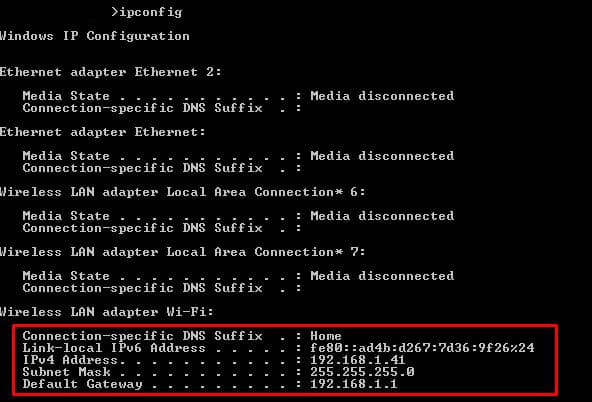
- In this network, the router (or Default Gateway) is playing the part of the DHCP server. It is assigning the IP accost dynamically and giving access to the Net.
- You are reading two of the most of import IP addresses for your device; Your own device's IP (IPv4 and IPv6) and your Gateway. The Subnet Mask is as well very important, it shows that you are on the same subnet as the gateway.
Now you know your subnet, which in this example is 192.168.one.0/24 (using the CIDR range). At present you need to find the remainder of the IP address in your network.
Scanning your Network
The job of the ARP protocol is to map IPs to MAC addresses. Information technology provides a method for hosts on a LAN to communicate without knowing whatsoever address and create a cache of information. When a new computer enters the LAN, information technology receives an IP and updates its ARP cache with the Gateway information. This ARP cache can exist found using the "arp-a" command.
- Apply the command line to enter the "arp -a" command.
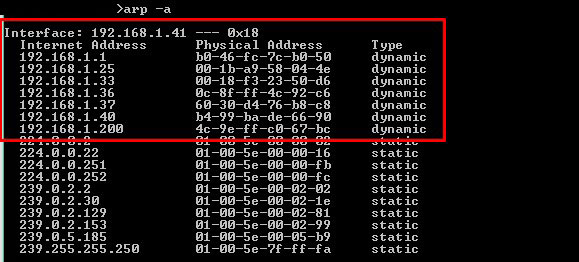
- This figurer has been connected for some time into the LAN, then its ARP cache is very precise and complete. The first IP address shown in the display is the Gateway (the same we found through the ipconfig command).
- The output shows the IP, the MAC addresses, and their assignation blazon. The addresses displayed here were dynamically assigned past the DHCP server in the LAN. All of these IPs are devices connected to the LAN (192.168.1.0/24). The other static addresses are reserved for Multicasting.
- With the MAC data, y'all tin can know the vendor. Effort searching for vendor prefixes or apply an automatic online tool such as MACvendors.
Testing Connectivity
Finally, with some information, you tin test connectivity. In the following examination, we tried an extended ping with "ping -t" to the gateway. With this, you can larn some unproblematic insights most delay and latency.
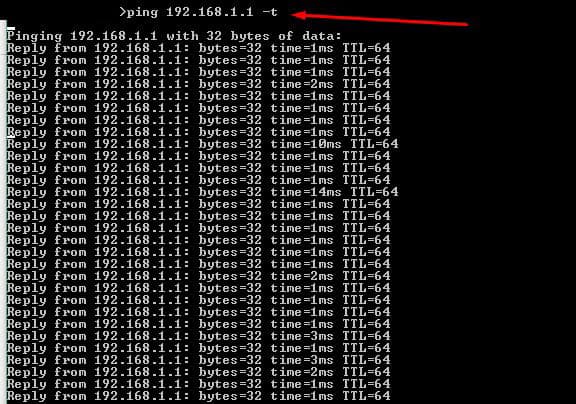
From the list generated by the ARP command, yous could ping all the live hosts. Or you tin can go across and ping the entire subnet to find hosts not found by the ARP (but that would be too much transmission work…). Later, we'll discuss how to automatically ping unabridged subnets at once.
Enhancing IP Scanning
Although having a listing of devices and their allocated IP address will give y'all good insights, the information will not exist plenty when your network scales. Manual IP scanning in multiple subnets and BYOD (Bring-Your-Own-Device) scenarios is nearly impossible. Every bit the network scales, issues volition scale too.
Larger networks demand more than results, flexibility, and like shooting fish in a barrel-to-read fix of commands.
An IP Address Scanner tool helps yous with larger demands. These tools are able to map the entire local network, finds live hosts, and to provide the results of the "arp-a" in a clearer format. Other IP Scanners do not depend on ARP only they operate using repeated ping tests. A Ping Sweep tool lets you ping entire subnets and detect live hosts merely with one button.
Some other IP Scanners go the extra mile and give more information such equally Port number, DNS, DHCP, etc. All of this data is likewise presented in the most visual and easy-to-read format. They also allow users to salvage all results and present them in detailed reports.
Advanced IP Scanners
Hither is our listing of the vii best tools for discovering IP addresses on a network.
- SolarWinds Port Scanner (Complimentary TOOL) A gratuitous IP address scanner that will search for all addresses inside a given range and identify which are in use and then examine which ports on each device are active. This tool uses multi-threading for high-speed searches. Installs on Windows Server.
- ManageEngine OpUtils (Gratis TRIAL) A suite of network address monitoring tools that covers IP addresses, MAC addresses, and port numbers with a cutting-down free version as well bachelor. Installs on Windows Server and Linux.
- Angry IP Scanner A free network scanner that identifies all connected devices and lists their IP addresses plus connectedness response speeds. Available for Windows, macOS, Linux.
- SolarWinds Ping Sweep (Costless TRIAL) Part of the Engineer's Toolset, this tool searches the network for all active IP addresses, reporting on the response time and showing hostnames from the local DNS server. Installs on Windows Server.
- MyLAN Viewer A network scanner that identifies all connected devices and lists their IP addresses and MAC addresses. Runs on Windows.
- SolarWinds IP Address Tracker (FREE TOOL) A free version of the SolarWinds IP Address Managing director. This tool is able to discover all devices connected to a network and give details of IP accost usage. Runs on Windows Server.
- SolarWinds IP Accost Scanner (FREE TRIAL) This is part of the SolarWinds IP Accost Manager. Use this every bit a standalone utility to identify all addresses in use or as part of the IPAM for wider IP address management functions. Runs on Windows Server.
The all-time IP Address discovery tools
1. SolarWinds Port Scanner
The SolarWinds Port Scanner tool is a swell all around tool for scanning port DNS Addresses and IP's inside the range that you specify, along with avant-garde abilities and capabilities that make it our #ane Pick on the list.
Some great features of this tool include some of the following features:
- Ability to create a list of Open/Closed/Filtered Ports of IP addresses specified in your range
- Scan Range along with specified TCP & UDP ports for identifying possible vulnerabilities
- Multi-threaded Scanning for Faster Scans!
- Ability to Launch and Run from either GUI or Control-line
- Choose a Custom DNS Server to utilise for Scanning
- Ability to Relieve Customized Configurations for Scanning
- Manage & Track Device and User Activity
- Edit & View IANA Port name definitions
- Export to CSV File for Bulk Editing and More!
Toll:
100% Complimentary!
Download:
solarwinds.com/complimentary-tools/port-scanner
Download Free!
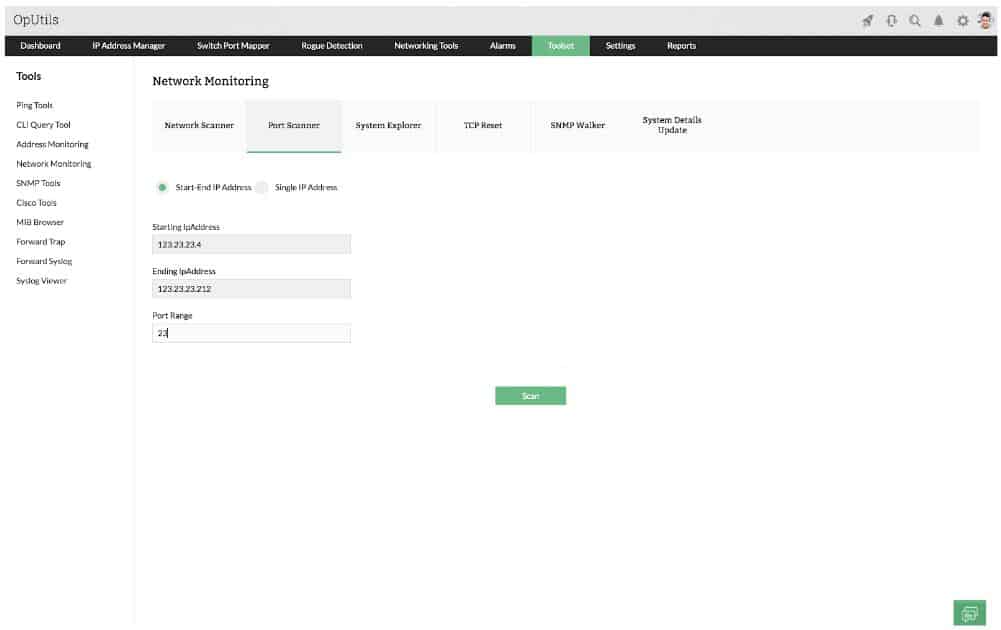
ManageEngine OpUtils combines an IP address managing director, a switch port mapper for MAC address discovery, and a port scanner to identify open TCP and UDP ports on all devices. This combination delivers all address-related functions that you volition demand in lodge to fully manage your network.
The IP address manager is, in itself, a suite of utilities. This grouping of services includes an IP address scanner. This will discover all of the devices connected to your network and listing the IP addresses allocated to them. The IPAM is able to produce IP address reconciliation reports that will enable you to update your native DHCP server in case information technology fails to notice expired address leases.
The IP accost tracker service in the parcel can produce a hierarchical view of your network, enabling you to identify subnets and the allocation of addresses to each. DHCP management tools in the pack permit y'all manage subnet address pools. The switch port mapper identifies each device by MAC address and switch port number. The port scanner in OpUtils lets you see which TCP and UDP ports on each device are open.
OpUtils is available for Windows Server and for Linux.
Price:
OpUtils is available in a Free version, which includes a port scanner and Ping utilities. Contact the ManageEngine sales team for a quote on the paid version.
Download:
The paid version of OpUtils tin can be downloaded as a thirty-24-hour interval free trial.
3. Angry IP Scanner
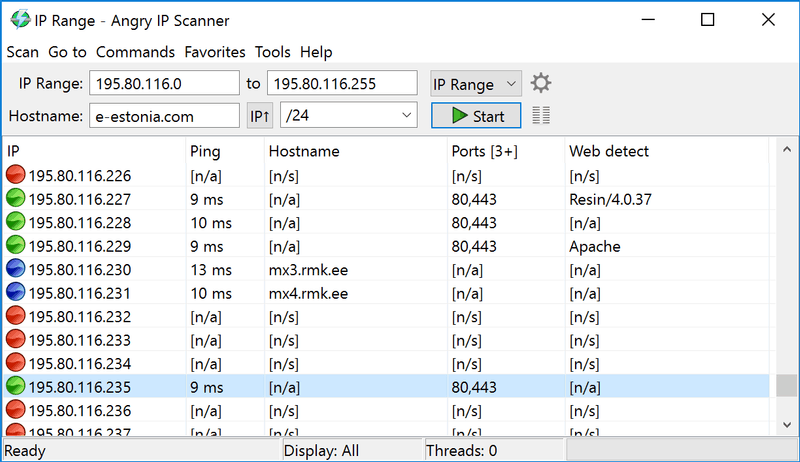
Angry IP Scanner is 1 of the most popular scanners on the web, with over 29 million downloads. It is open up-source, free, and bachelor for Windows, MacOS, and Linux. It tin allow y'all scan your local network or the Internet-facing IP addresses.
This tool is not but capable of scanning IP addresses but besides ports. When you ascertain an IP address range, you can also specify a number of the port, and meet if a device in your network is using a specific service (defined by the port). Angry IP Scanner also lets you salvage all the scan results into multiple formats, such as TXT, XML, CVS, etc.
When you scan, you'll know what hosts are alive, their response time, hostname, MAC address, etc. If you desire even more information, you can extend results past developing Java plugins.
Toll:
Open up Source and 100% gratuitous.
Download:
Get Angry IP from its official site.
4. SolarWinds Ping Sweep
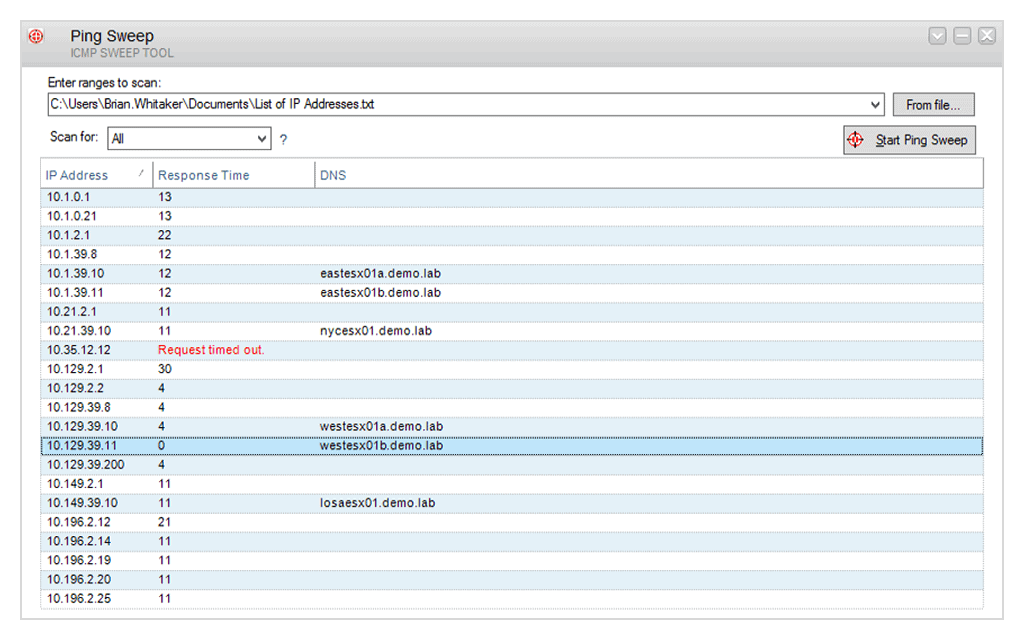
Ping Sweep from SolarWinds helps you lot find free IPs and identify which ones are unavailable. It is classified every bit a networking discovery tool from the SolarWinds Engineer'south Toolset. A comprehensive network software, that includes over lx handy tools. Ping Sweep from SolarWinds is included in the Engineer's Toolset and is dedicated for ping testing. For the MAC address, port scans, SNMP scans, etc, there are more dedicated tools in the Engineer'south Toolset.
Merely equally when you lot ping from the command line, this tool shows the DNS proper noun for each IP and response fourth dimension. It can also let you consign results in different formats such every bit CSV, TXT, XLS, and to an HTML page.
Price:
SolarWinds Engineer's Toolset gives you a 14-day Free Trial and it includes over 60 must-take tools.
Download:
Go a fully functional Engineer'southward Toolset for 14 days by registering to SolarWinds official site.
Download Costless!
IP Accost Tracker Tools
Having a map of IP addresses, MAC addresses, used ports, etc, is nifty for networking inventorying and may help with some troubleshooting cases. Merely a list can not command and display real-time results.
An IP address Tracker is a good upgrade to our set of tools and commands described so far. It does let scanning multiple subnets and displaying results, but it too allows you to proceed track of one or more IP addresses.
An IP Address Tracker will find when an IP address is released. This can be either considering the device lost connectivity or information technology changed IP accost. Information technology will help yous minimize IP addressing conflicts (when two devices are trying to accept the same IP) and reduce DNS errors.
5. MyLAN Viewer
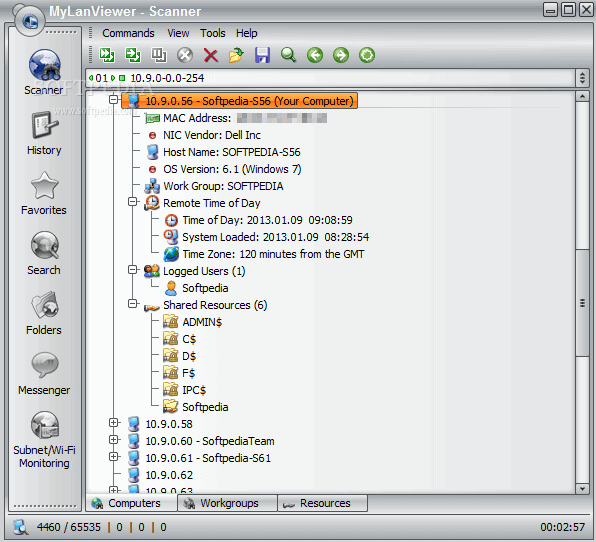
MyLAN Viewer is a NetBIOS and IP address scanner for Windows systems. Only like the IP Scanners shown in a higher place, this tool will browse a network and prove devices in an piece of cake-to-read format.
But MyLANViewer goes across, and non merely shows estimator proper name, IP, and MAC, but too NIC, OS version, logged users, shared folders, and much more.
This tool is able to track specific IP addresses and evidence notifications when their state modify. With it, you can also keep track of network security by showing port information and detecting rogue DHCP servers. MyLAN Viewer tracks all devices in the subnet including hidden, and displays alerts when new devices enter the network, and others go.
This tool can also display the following metrics as well:
- Display Whois data.
- Perform traceroute.
- Manage "Remote Shutdown and Wake On LAN (WOL)".
- Monitor wireless networks.
Price:
Free, but only available for Windows systems.
Download:
Go MyLAN Viewer from its official site.
Related Post: Best Wake On LAN Tools
six. SolarWinds IP Accost Tracker
![]()
SolarWinds IP Address Tracker is a standalone software and completely free. In addition to creating inventories of all devices, this tool allows you to browse, rails, and manage IP accost, including their effect logs, all in a single identify. SolarWinds IP Tracker is the free version and feature-limited of the much coveted IP Address Manager.
But the IP Tracker does an amazing chore to provide a centralized view of the entire IP addressing scheme. It lets you monitor 256 (one subnet) IP addresses for free. Additionally, this tool allows basic management functionalities with tools such as, Ping, Telnet, Traceroute. The all-time of all is that, with SolarWinds IP Accost Tracker you can detect IP address conflicts created by misconfigured DHCP servers.
SolarWinds IP Tracker is simply supported by Windows systems.
Price:
100% Gratuitous.
Download:
Register with SolarWinds to download the software for costless.
Download 100$ Complimentary!
IP Accost Direction (IPAM)
Basic IP Address Scanning should be plenty to manage modest networks. Only when networks calibration they depend on multiple subnets and detailed management requirements. Although SolarWinds IP Tracker is able to find IP address conflicts, it is not able to control them.
Sometimes large-scale networks have standalone DHCP and DNS Servers in club to assign addresses to multiple subnets. Simply IP conflicts occur and it is really challenging to manage them manually. An IP Address Management or "IPAM" is a piece of software able to actively control DHCP and DNS. It too gives yous the ability to manage multiple subnets.
7. SolarWinds IP Address Scanner
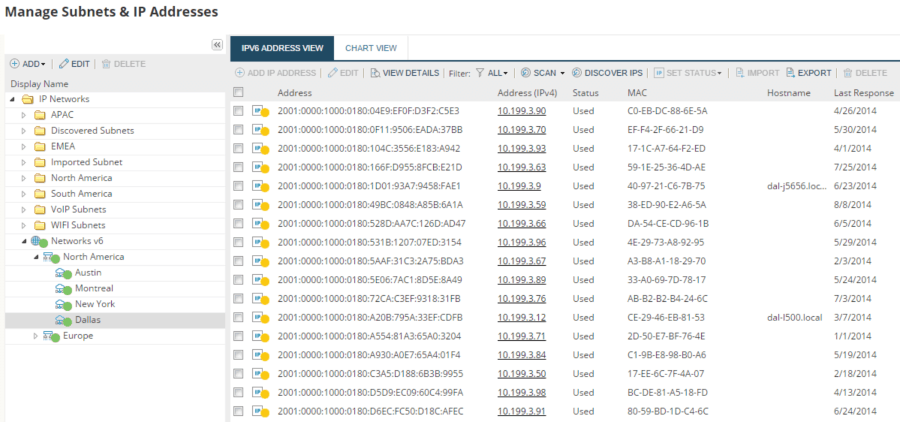
Among SolarWinds powerful tools, the IP Accost Director does everything a big-calibration enterprise needs to manage its addresses properly. It automates many processes to make IP Address direction easier. From automatic IP address tracking, quick static IP reservations, to multi-vendor DHCP and DNS support.
SolarWinds IPAM comes with an integrated IP address management, DHCP, and DNS tools to administrate your entire network.
One of the nigh commonly used tools from this bundle is the IP Address Scanner. This tool allows you to create automated IP accost scans to maintain an updated inventory of all IP address blocks in the network. This is achieved by sending regular ICMP and SNMP polls. The automated scans use ICMP polls to get together status of the IP address and hostname data. It also uses SNMP to discover information on MAC addresses and other vendor information. SolarWinds IP Accost Scanner supports both IPv4 and IPv6 address direction.
SolarWinds IPAM also provides detailed reports of your IP address in real-time.
Toll:
Download the Free Trial for thirty Days!
Download:
Get a fully functional SolarWinds IPAM on a 30-mean solar day trial.
Download Complimentary Trial!
IP accost scanning FAQs
How do I find a network name from an IP address?
To become the network name of a host from an IP accost yous need to query the DNS server. Open a Control Prompt window and enter nslookup <IP_address> putting in the IP address yous have instead of <IP_address>.
How do I identify an unknown device on my network?
To see all of the devices connected to your network, blazon arp -a in a Command Prompt window. This volition prove you the allocated IP addresses and the MAC addresses of all connected devices. To get the hostname of each IP address you see in the list, use nslookup <IP_address> putting in the IP address yous have instead of <IP_address>.
How can I tell what device is at an IP address?
To get deeper data on devices connected to your network rather than just an IP accost or MAC address, utilise a network monitor that scans for details with SNMP – the SolarWinds Network Operation Monitor is ane example.
Source: https://www.pcwdld.com/how-to-scan-network-for-ip-addresses
Posted by: ryanlesse1976.blogspot.com

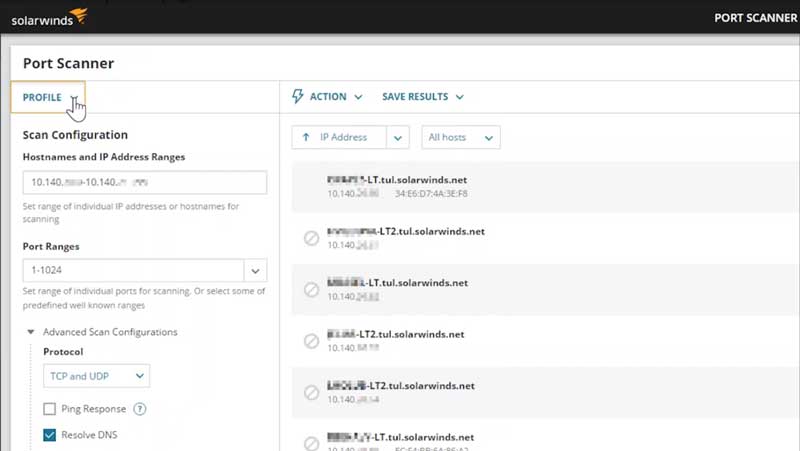

0 Response to "How To Find Ip Address Of Devices On Your Network"
Post a Comment